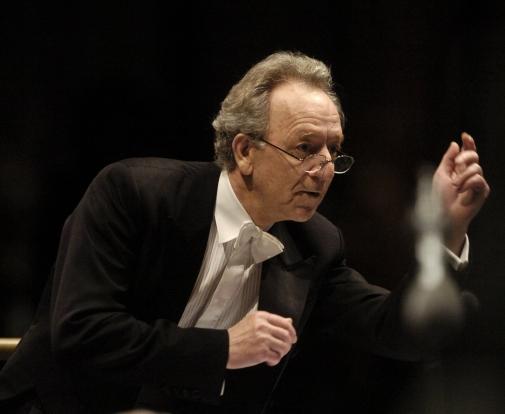Perhaps we'd better get the Prokofiev part of the opening concert out of the way first. I have a real problem with Russian whizz pianist of the moment Denis Matsuev. His iron-clad technique and heavyweight thunder still leave some room for quieter playing, but where were the atmosphere or the bright nimbleness in the tour de force of the Third Piano Concerto? True, you feel safe in Matsuev's hands from the word go, and fiendish elements in the solo role which Prokofiev wrote for his own chameleonic keyboard genius and which stretch even as marvellous a pianist as Martha Argerich to the limits pose no apparent challenge to him. But all those accents Matsuev will insist on highlighting remind me of another crasher - and Gergiev favourite - Alexander Toradze; and why was I switching off for the dreamy heart of the first movement and counting the number of men with white walrus moustaches sitting in the Festival Hall choir seats?
At least this is a showcase concerto that highlights Prokofiev's huge personality - the quality Stravinsky stressed the most about his colleague's music; I'd hate to hear Matsuev in the hypertragic Second Concerto (fortunately Temirkanov will be working with the maverick Boris Berezovsky on that one). I'll confess I was momentarily surprised by the pointed wit Matsuev brought to the first of the central variations on a gavotte. Yet though the crowd went crazy, where were the crystalline clarity and pizzazz interpreters more in the line of Prokofiev himself as pianist can and should bring to its multiple romps and charges? Following a clumsy performance at the Proms of Rachmaninov's Rhapsody on a theme of Paganini, this is the second occasion on which I've heard Matsuev tie lead weights to winged subjects, and I don't especially want to witness another. It was left to Temirkanov, a nimble operator unlike Matsuev's Rachmaninov partner Semyon Bychkov, to bring out every witty, airy detail in the scoring and to inspire the horns to full-throated feats in the Scythian cavalcade towards the end of the central movement. Friends further back in the auditorium reported balance problems; none existed from my privileged perspective.
He kicked off the evening with spring-heeled elan by fanfaring the Polonaise from Tchaikovsky's Eugene Onegin. A stressy ballet doyenne behind me opined loudly that dancers couldn't possibly convey the dignity of the Polish-derived court ceremonial at that speed, but I suggest they'd find themselves airborne above Temirkanov's cushion of sound (he launches into the dance proper each time with what Germans like to call luftpausen, those momentary stops for air which only the most flexible of conductors can achieve). The buoyant phrasing beamed confidence, and I've never seen the majority of a large double-bass section grinning so engagingly.
Big launch of the symphonies sequence was the most oratorical of Tchaikovsky's mighty three, the Fifth. Temirkanov may not have had the luxury the greatest Russian conductor of them all, Yevgeny Mravinsky, used to insist upon: an average of 16 rehearsals for each of these repertoire staples. But the orchestra had already played the Fifth under Temirkanov in Bedford and Leicester, so it came to London trailing clouds of glory. He's a conductor for whom the injunction tempo rubato - that art of stealing time and giving it back even in a single bar - might have been written. No two phrases of the many Tchaikovsky reiterates in his first movement sounded the same (I'm thinking particularly of the strings' rapturous leaps between woodwind piping that lead into the lyrical countertheme). The onward trudge of destiny after the dark, clarinet-led opening theme of fate-as-providence advanced in velvet slippers, quickening towards handsome climaxes.
You'll never hear a better argument for the great, horn-dominated Andante cantabile, the ultimate in singing flexibility twice broken by shattering blows of fate. Both these and the final triumphant parade which usually rings so hollow were ballasted by the peculiarly weighty sound Temirkanov always carries with him: you could no longer talk of a Philharmonia personality, only of a kind of Temirkanov Philharmonic. Trumpets and trombones rang out with Soviet-style force mitigated by western sophistication; the timpani thundered, but never with mere vulgarity. As for the central battle before victory, its blindingly brilliant articulation would, I think, have led even the notoriously perfectionist Mravinsky to doff his cap. I have to miss the next two instalments, but you mustn't: this is as great as Tchaikovsky gets.















Add comment